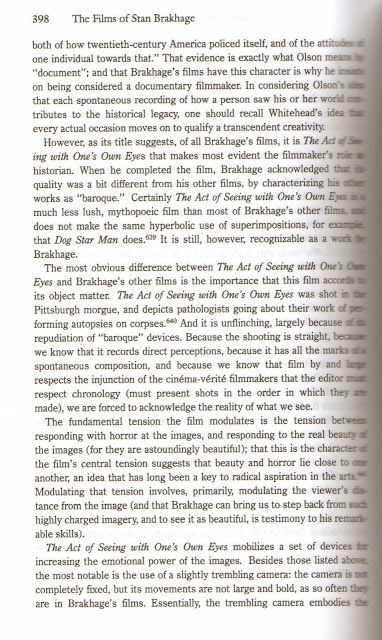Showing posts with label The Act of Seeing with One's Own Eyes. Show all posts
Showing posts with label The Act of Seeing with One's Own Eyes. Show all posts
8.7.13
New Composition
3:05 PM
---
Stan Brakhage: The Pittsburgh Documents will take place on July 20th at UCLA. The following is from the 20th Anniversary Edition of Millennium Film Journal . A PDF copy is available through MFJ ...
---
---
25.5.10
The Act of Seeing with One's Own Eyes
7:45 PM
---
---
(From a 1972 screening/Q&A at the Millenium Film Workshop)
---
---
(From The Films of Stan Brakhage in the American Tradition... by Bruce Elder)
---
---
---
---
(From the No. 56/57 Spring 1973 issue of Film Culture)
---
---
MacDonald: I saw The Act of
Seeing at an early screening, in Binghamton in 1972, and it was a
transformative experience for me. You were not there. I was furious
after the film and wanted to stand up and scream at the programmers for
showing it—but within a few weeks, I was already thinking how it would
be exciting and valuable to show the film to my students and to the
public audience I was programming for. Am I right that The Act of Seeing
has become one of the more popular of your films?
Brakhage: Yes.
Also, of all the films I've made—and let me preface this by saying that I
have always wished that I was not who I am, but the Hans Christian
Andersen of film: I would easily give up everything to have been a great
children's storyteller (of course, Andersen wanted to be Charles
Dickens, so there we go: no one ever gets to be exactly what he wants to
be)—this film was the film that our children always asked to see, and
that they wanted to bring their friends in to see (I'd have to get
permission of the parents, some of whom wouldn't give it). My children
have always wanted to see this film, above everything else of my making,
and see it over and over.
Children are always trying to figure out how bad things can get, and they love gruesome tales. And there is a fairy-tale quality to that film in a way. To all three of the Pittsburgh films.
Children are always trying to figure out how bad things can get, and they love gruesome tales. And there is a fairy-tale quality to that film in a way. To all three of the Pittsburgh films.
MacDonald: When I
was a kid and encyclopedia salesmen came by, the section of the body
were imaged on clear sheets of plastic; you could "enter" the body:
skin, the muscles, nerves, organs, bones. So their reaction makes sense
to me.
Brakhage: The
children also accepted the form of the film in a way that some adults
haven't been able to. It's a very dark vision and gets darker and darker
as it moves along.
MacDonald: Though
near the end you seem to have a kind of epiphany and become almost a
child yourself in the excitement of exploring what seem to me to be
landscapes. The camera becomes a plane swooping through these strange
formations.
Brakhage: Oh, I'm
glad for that. To me one thing that saves the film is this little tiny
bit of reflected sky that's caught in a little puddle of liquid in the
armpit of a corpse—a little blue ephemeral thing that can stand for all
of Spirit, which otherwise would be missing.
Also, I think it's funny that at the end a little man in a little bow tie is seen reciting all this horror into a tape recorder. He turns it off, and the film is over. The Act of Seeing is full of jokes like that—it's black humor to be sure, but humor. The fly crawling on a toe. Or the zipping up of the body bag soon after a knife comes down and "unzips" a whole torso. Those moments are there to lighten the load of watching.
Also, I think it's funny that at the end a little man in a little bow tie is seen reciting all this horror into a tape recorder. He turns it off, and the film is over. The Act of Seeing is full of jokes like that—it's black humor to be sure, but humor. The fly crawling on a toe. Or the zipping up of the body bag soon after a knife comes down and "unzips" a whole torso. Those moments are there to lighten the load of watching.
(From a Critical Cinema 4 by Scott MacDonald)
---
Labels:
Daniel H. Levoff,
Marie Nesthus,
Millennium Film Workshop,
R. Bruce Elder,
Scott MacDonald,
Stan Brakhage,
The Act of Seeing with One's Own Eyes
|
1 comments
Subscribe to:
Comments (Atom)


















